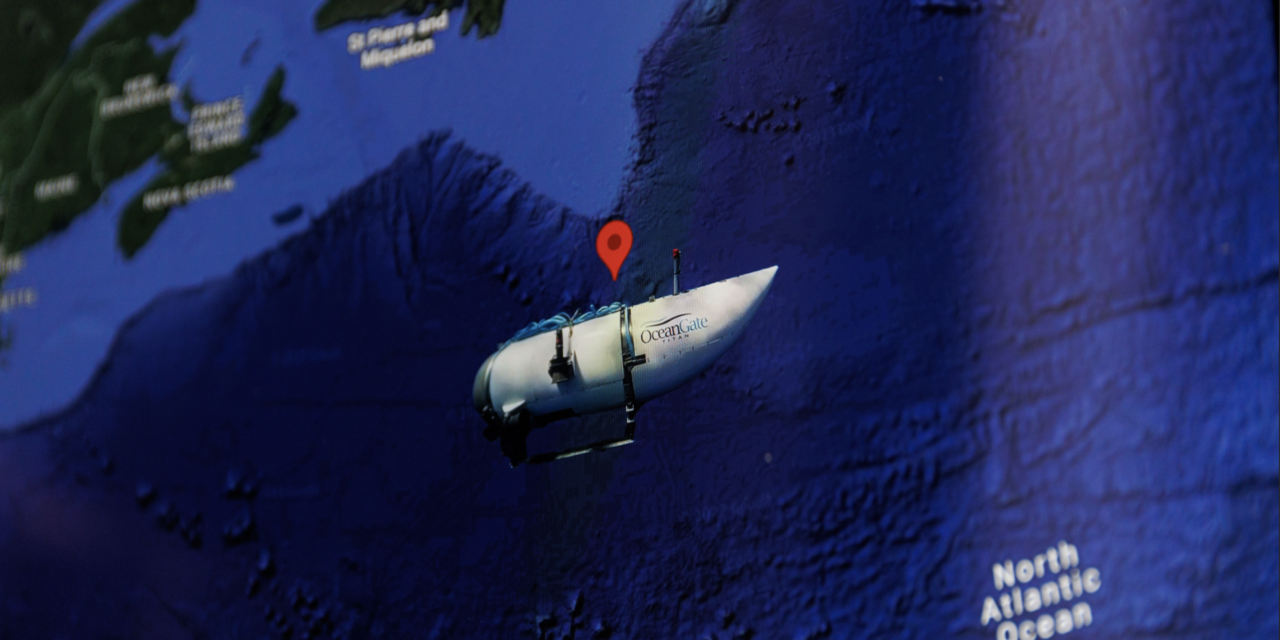Reports from the United States Coast Guard of discovered debris on Thursday, including the tail cone, in the area of the missing Titan submersible have dashed hopes of a dramatic last-minute rescue, a somber turn in the ongoing search and rescue mission off the coast of Newfoundland.
“On behalf of the United States Coast Guard and the entire unified command, I offer my deepest condolences to the families,” said Rear Admiral John Mauger earlier today.
The lost vessel was originally launched by OceanGate Expeditions, a private company founded in 2009 by Stockton Rush and Guillermo Sohnlein. The submersible has been missing since Sunday when it lost contact with its support ship, the Polar Prince. They were planning to explore the wreckage of the RMS Titanic, the luxury British passenger liner that sunk in 1912.
Oceangate officials now believe all aboard have been lost. Families have been notified.
The coordinated five-nation search-and-rescue mission has captivated media, with many cable news networks devoting significant portions of their broadcast to the story.
Throughout the week, some have questioned why anyone would risk their lives to “explore” something that’s already been thoroughly examined. Others have criticized the cost of the venture – $250,000 per passenger – and chalked it up to wealthy people having too much time and resources.
The Daily Wire’s Matt Walsh took a different tack, tweeting earlier this week:
“We used to respect people who were willing to risk their lives for the sake of exploration. Now we openly despise them and laugh when they die. This is a sign of cultural sickness.”
Since time began, it would seem the oceans have been both endlessly interesting and profoundly mysterious. Even today, scientists have noted we know far more about outer space than the sea itself. In fact, though the oceans make up 71% of the earth’s surface, we’ve only explored five percent of the deep.
“We have better maps of the surface of Mars and the moon than we do of the bottom of the ocean,” NASA’s oceanographer Dr. Gene Feldman said last year.
It’s been pointed out the sea was considered a “double-edged sword” back in biblical times. We know Jesus surrounded himself with several fishermen, disciples who risked the winds and the waves to provide food for their families. We also know those winds and waves cost many people their lives. This duality continues to this day.
Scripture is replete with references to the ocean, some that even predicted what man could never have known thousands of years ago.
“There is the sea, vast and spacious, teeming with creatures beyond number— living things both large and small,” wrote the Psalmist (104:25). Other passages point to the sea as a sign of God’s power. “This is what the Lord says, he who appoints the sun to shine by day, who decrees the moon and stars to shine by night, who stirs up the sea so that its waves roar— the Lord Almighty is his name” (Jeremiah 31:35).
One of the biblical references to the oceans has even been a source of theological debate.
We read in Revelation that when John was given a peek at Heaven, he said “there was no longer any sea” (21:1). Should we interpret that literally? Pastor John MacArthur thinks so.
“The sea is emblematic of the present water-based environment,” MacArthur writes. “All life on earth is dependent on water for its survival … But believers’ glorified bodies will not require water, unlike present human bodies, whose blood is 90 percent water, and whose flesh is 65 percent water. Thus, the new heaven and the new earth will be based on a completely different life principle than the present universe. There will be a river in heaven, not of water, but of the ‘water of life.’”
Bestselling author Randy Alcorn disagrees.
Instead, he believes the reference suggests “there will be no more of the cold, treacherous waters that separate nations, destroy ships, and drown our loved ones. There will be no more creatures swallowing up seafarers and no more poisoned salt waters.”
The “catastrophic implosion” of the Titan Surmisable inevitably casts a temporary pall on oceanic exploration, but it will not stop future expeditions or our ongoing curiosity about the sea. The concentrated attention to the tragedy does remind us all how little we know about the deep – and despite all our technical advances, just how deep, massive and mysterious God’s creation remains.
Photo from Shutterstock.






